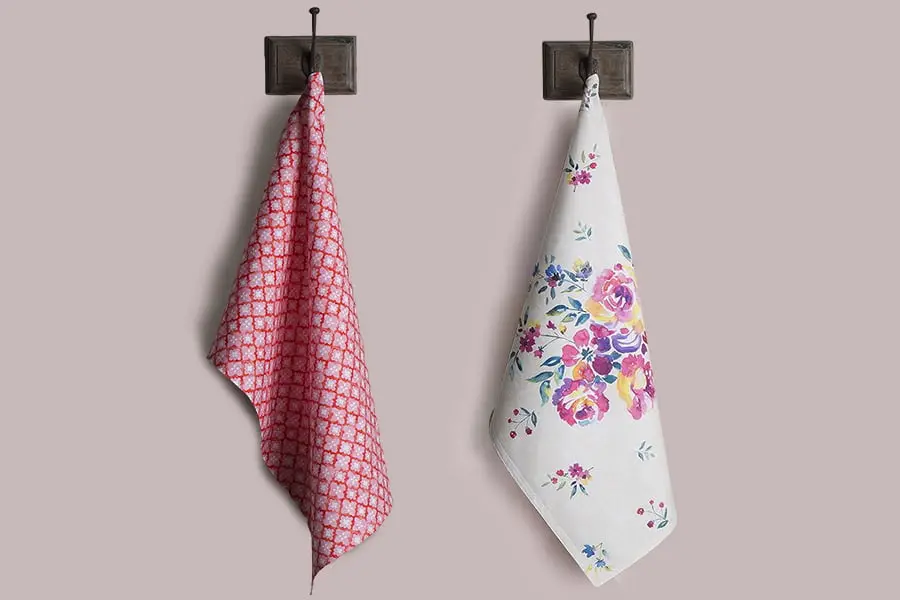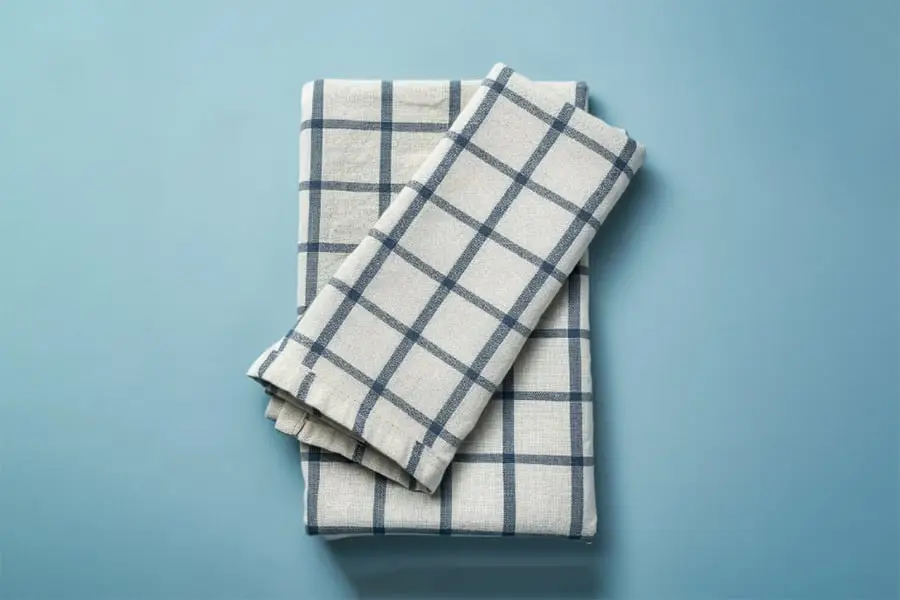The Essential Guide to a Tea Towels: Their Uses, Benefits, and How to Choose the Best One For Kitchen
Introduction: Tea towels are a must-have in every kitchen, offering both functional and decorative value. Whether drying dishes, wrapping baked goods, or even acting as stylish accessories, tea towels are versatile tools that serve many purposes. This comprehensive guide explores the uses of tea towels, their advantages and disadvantages, and the distinction between tea towels and kitchen towels. We’ll also explore where to buy the best tea towels online.
What is a Tea Towel?

A tea towel is a soft, absorbent cloth, traditionally made from linen or cotton, used primarily in kitchens for drying dishes or cutlery, handling hot items, and sometimes as decorative accessories. Originating in the 18th century, tea towels were initially used to dry fine china and delicate tea sets, hence the name.
Unlike heavier kitchen towels, tea towels are thinner and more absorbent, making them ideal for delicate tasks. Their lightweight design allows them to be used for a variety of purposes beyond drying dishes, such as serving baked goods or polishing glassware.
Where to Buy Tea Towels Online
There are many online retailers offering a wide variety of tea towels in different materials, sizes, and designs. Here are some of the best places to buy tea towels online:
Uses of a Tea Towel
Tea towels are incredibly versatile and can be used in numerous ways around the kitchen and home. Below are some common and creative uses:
1) Drying Dishes
The most traditional use of tea towels is drying dishes and cutlery after washing. Their soft texture ensures delicate items, like glassware, can be dried without scratching.
2) Polishing Glass and Silverware
Tea towels, especially those made from linen, are ideal for polishing glassware and silverware due to their non-abrasive surface, leaving a streak-free shine.
3) Handling Hot Dishes
In addition to oven mitts, tea towels can be used as makeshift pot holders for handling hot dishes, pots, or pans.
4) Covering Food
Tea towels can be used to cover baked goods, like bread or rolls, allowing them to cool without drying out. They also add a touch of rustic charm when serving.
5) Table Napkins or Place Settings
With their variety of designs, tea towels can double as table napkins or serve as a decorative place setting for meals, especially in casual dining settings.
6) Wrapping Gifts
Tea towels make eco-friendly wrapping paper alternatives for gifts. This practice, often referred to as “furoshiki,” adds a personal touch and gives the recipient a reusable item.
7) Decorative Purposes
Tea towels come in a wide range of colors and patterns, making them great for decorative purposes. They can be displayed on towel racks or folded on kitchen countertops to add a splash of color.
8) Cleaning and Dusting
Due to their absorbent and non-abrasive nature, tea towels can be used for cleaning surfaces, dusting, or even wiping down mirrors and windows.
9) Personal Use
Outside the kitchen, tea towels can be used for personal care, such as drying hands or even as makeshift bibs or aprons during messy tasks.
Pros and Cons of a Tea Towel
Like any product, tea towels come with their advantages and disadvantages. Here’s a closer look:
Pros of Tea Towels
- Versatile Use: Tea towels can be used for various kitchen tasks, from drying to serving.
- Eco-Friendly: Tea towels are reusable, reducing the need for disposable paper towels.
- Durability: High-quality tea towels, especially those made of linen, are long-lasting.
- Stylish: Tea towels are available in countless colors and designs, adding personality to any kitchen.
- Absorbency: Cotton and linen tea towels are highly absorbent, making them perfect for drying dishes quickly.
Cons of Tea Towels
- Stain Easily: Due to their frequent use, tea towels can stain easily and require regular washing.
- Can Wear Out: Over time, especially with constant washing, tea towels may lose their absorbency and become worn.
- Not as Thick as Kitchen Towels: Tea towels are thinner than traditional kitchen towels, which may make them less suitable for heavier kitchen tasks.
Tea Towel vs Kitchen Towel: What’s the Difference?
Although the terms “tea towel” and “kitchen towel” are often used interchangeably, there are distinct differences between the two.
Material
- Tea Towels: Usually made from lightweight fabrics like linen or cotton, tea towels are thinner and more delicate.
- Kitchen Towels: Made from heavier, more absorbent materials like terry cloth or microfiber, kitchen towels are designed for heavy-duty tasks like mopping up spills.
Purpose
- Tea Towels: Primarily used for drying delicate items like glassware, as well as serving and decorative purposes.
- Kitchen Towels: Often used for more practical purposes like drying hands, wiping surfaces, or cleaning up larger spills.
Aesthetic Appeal
- Tea Towels: Often come in decorative patterns and are used to add a touch of style to the kitchen.
- Kitchen Towels: While some are decorative, they are usually more functional and less likely to be used for decorative purposes.
Absorbency
- Tea Towels: Although absorbent, tea towels are not as thick and heavy-duty as kitchen towels.
- Kitchen Towels: Designed to absorb large amounts of liquid quickly, making them better suited for heavier kitchen tasks.
Why Is It Called a “Tea Towel”?
The term “tea towel” originated in England in the 18th century. These towels were specifically used for drying tea sets made of delicate china or porcelain, which required a gentle, soft cloth. Wealthy families often used tea towels to serve tea, and they were sometimes embroidered to match the fine dining sets they accompanied.
The name “tea towel” stuck, even though their uses have expanded beyond drying tea sets. Today, tea towels are a kitchen essential around the world, used for a variety of purposes beyond just tea service.

FAQs of Tea Towels
- What is the difference between a tea towel and a dish towel?
Tea towels are typically made from softer materials like cotton or linen and are thinner compared to dish towels, which are often made from more absorbent fabrics like terry cloth. Tea towels are ideal for drying delicate items like glassware and for decorative purposes, whereas dish towels are more robust and better suited for drying heavier items or cleaning up spills.
- Can I use a tea towel to dry my hands?
Yes, tea towels can be used for drying hands, but keep in mind that they are generally thinner than regular hand towels. If you prefer a softer, more absorbent towel for drying hands, you may want to look for cotton tea towels, which are slightly more absorbent than linen ones.
- Are tea towels machine washable?
Most tea towels are machine washable. Cotton and linen tea towels can generally be washed in warm water and dried on a low setting. Be sure to follow the care instructions provided by the manufacturer to avoid shrinking or damaging the fabric. Washing them regularly will keep them hygienic and fresh.
- How often should I replace my tea towels?
The lifespan of a tea towel depends on its material and how often it is used and washed. High-quality linen tea towels can last for years, while cotton tea towels may need to be replaced every 6 months to a year if used frequently. Signs that it’s time to replace your tea towel include visible wear and tear, loss of absorbency, and lingering odors even after washing.
- Can I use tea towels for baking?
Yes, tea towels are often used in baking for tasks like covering dough while it rises or wrapping bread to keep it warm. The breathable fabric of linen tea towels, in particular, is ideal for this purpose as it helps regulate moisture, preventing baked goods from drying out.
- Are there eco-friendly tea towels?
Many tea towels are eco-friendly because they are reusable, reducing the need for disposable paper towels. Look for tea towels made from organic cotton or sustainable linen for the most eco-friendly option. Avoid synthetic materials, which may have a larger environmental footprint.
- What size should a tea towel be?
Tea towels typically range in size from 18 x 28 inches to 20 x 30 inches. The ideal size depends on how you plan to use it. If you’re drying larger dishes or using it for decorative purposes, a larger size may be better, while a smaller tea towel may suffice for light tasks like drying cutlery or cleaning up small spills.
- Why do tea towels get stiff after washing?
Tea towels may become stiff after washing due to detergent buildup or using hard water. To prevent this, avoid using too much detergent, and consider adding a cup of white vinegar during the rinse cycle to soften the towels. Regularly washing and drying them correctly will keep them soft and absorbent.
- Can tea towels be used for cleaning?
Yes, tea towels can be used for cleaning surfaces, windows, mirrors, or dusting furniture. Their lint-free properties, especially in linen tea towels, make them excellent for streak-free cleaning, particularly for glass or polished surfaces.
- Can tea towels be used in the microwave or oven?
Tea towels should not be used in the microwave or oven as they are not designed to withstand high temperatures for extended periods. However, you can use them to handle hot dishes briefly or to cover food being warmed in the microwave for short intervals.
Conclusion
Tea towels are more than just a simple kitchen accessory; they are versatile, functional, and stylish. From drying dishes to serving as decorative elements in your kitchen, tea towels have a multitude of uses that make them indispensable. Understanding the differences between tea towels and kitchen towels helps you select the right tool for the job. Whether you’re looking for practicality or a touch of elegance, investing in high-quality tea towels is always a smart choice.
If you’re looking to purchase the best tea towels online, remember that platforms like Amazon, Etsy, and Williams Sonoma offer a diverse range of options to suit any taste and budget.
FOR MORE GO TO HOME PAGE




